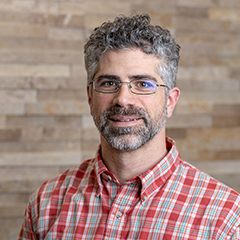
Dr. Derek F. DiMatteo is Assistant Professor in the Department of English at Gannon University in Erie, PA.
Teaching
In the Fall of 2023, I will be teaching courses in American literature since 1945, young adult literature, and education in US popular culture.
Current Research
I am working on a chapter contribution to a forthcoming edited collection on Donald Glover's series Atlanta and African American satire since 2014.
Critical Ethnic Studies Symposium
I am a past-organizer of the symposium and the coordinator of its graduate student workshop. The 2019 symposium examined the conjunctures of nationalism, borders, and personhood through interdisciplinary lenses on dissent, social movement, ideological restriction or contestation, and state violence.
About My Teaching
Teaching Statement
My interdisciplinary training has prepared me to teach anything from first-year composition to special topics courses. In the course I designed, "Education in US Popular Culture,” students study written and visual texts on K-12 education (e.g. using Maria Montessori’s writings as a lens to analyze the film School of Rock), which appeals to the general undergraduate as well as students in education. In my professional writing class, students work in small groups to practice business communications, job documents, and project proposals. As a culminating project, students research solutions to a problem experienced by a local business or campus organization and write a recommendation report that they actually submit. In my introduction to fiction course, “The Uses and Value of Literature,” I frame our readings (e.g. Kincaid, Baldwin, Cather, and Lahiri) as a way to reflect on life experiences (ours and others’) and to ask big questions, such as the individual’s role in the community, the function of memory and forgetting, and the power of familial love. In fall 2019, I taught local community members in an adult education course entitled “Immigrants, Refugees, and Returnees in literature,” which explored belonging, identity, and migration in transnational novels and short stories.
Over the past twenty years of teaching, my pedagogy has become primarily student-centered, and I design my courses to encourage student participation, intellectual growth, and self-reflection. I do this by creating opportunities for students to share responsibility for course content. For example, in my composition and public speaking courses, each week different students find a text and show classmates how it illustrates a lesson topic. My favorite method of building a culture of thoughtful engagement is through student-led, text-based discussions that emphasize the collaborative exploration of ideas. Debriefing the activity helps students improve their participation, while short reflection papers ask students to connect the ideas in the text and the discussion to their own lives and the broader world. By inviting collaboration in the classroom and in the learning process, I help students to see their education as an intellectual journey, not as a series of boxes to check.
My teaching in the classroom is informed by (and informs) my research, which focuses on forms of social protest in education. Originating with a study of protest about the conditions of K-12 education during the 1960s–70s, analyzing texts such as Jonathan Kozol’s Death at an Early Age, my research has expanded to the field of higher education. My dissertation is a mixed-methods American Studies project in which I analyze cultural works such as Jane Smiley’s campus novel Moo and life writing by academics. My research shapes how I design some of my courses, such as the argumentative writing course I designed around current debates in higher education (e.g. free college tuition, sanctuary campuses, and campus gun policies). It has also been the foundation for an interdisciplinary course that I designed titled “Higher Ed, Pop Culture, and You,” which asks students to analyze their family’s college history alongside readings such as Richard Rodriguez’s The Hunger of Memory and films such as John Singleton’s Higher Learning.
Courses Taught
Gannon University, Erie PA
College of Humanities, Education, and Social Sciences
ENGL 232: Education in U.S. Popular Culture
ENGL 344: American Literature since 1945
ENGL 101: Foundations of Academic Writing
ENGL 389: Methods of Teaching English
ENGL 374: Young Adult Literature
LENG 112: Critical Analysis and Composition
LENG 111: College Composition
LENG 241: Prose Literature
Indiana University Bloomington
Lifelong Learning
Immigrants, Refugees, and Returnees in Literature
College of Arts and Sciences
ENG-L204: Introduction to Fiction (The Uses and Value of Literature)
ENG-W270: Argumentative Writing (Current Debates in Higher Education)
ENG-W231: Professional Writing Skills
ENG-W202: English Grammar Review
ENG-W170: Projects in Reading & Writing (Representations of Schooling in U.S. Culture)
ENG-W131: Reading, Writing, and Inquiry I (Gender, Race, and Nation)
* Teaching Assistant for ENG-L260: Introduction to the Advanced Study of Literature
GROUPS Scholars Program
ENG-J101: Introduction to College Writing
Lakeland University Japan
General Education
GEN 112: Persuasive Writing
GEN 111: Public Speaking
GEN 110: Expository Writing
GEN 101: Reading Workshop
Freshman Seminar, “Dracula and Critical Theory,” team-taught, June 2010
English for Academic Purposes
EAP/IN-W: Intermediate Writing
EAP/HB-LS: High-Beginner Listening/Speaking
EAP/HI-LS: High-Intermediate Listening/Speaking
EAP/LA-LS: Low-Advanced Listening/Speaking
EAP/IN-R: Intermediate Reading
EAP/HI-R: High-Intermediate Reading
EAP/LA-R: Low-Advanced Reading
Continuing Education Program
LIT 1: Literature Appreciation
Professional Memberships
- Northeast Modern Language Association (NeMLA)
- Modern Language Association (MLA)
- Multi-Ethnic Literature of the United States (MELUS)
- National Council of Teachers of English (NCTE)
- American Studies Association (ASA)
- Japan Association for Language Teaching (JALT)